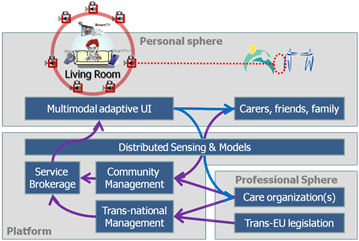SALIG++
People prefer to live independently in their own homes for as long as possible. However, demographic changes, rising costs and new family structures are increasing the demands for new care solutions. Self-care and informal carers will play a key role in these new solutions. In order to support the ability of informal carers it becomes essential to reduce the impact of physical distance, increase informal carer presence in the daily life of elderly and to support cooperation between formal and informal carers to foster complementarity. To address these challenges, new care solutions should go beyond state of the art and enhance presence, awareness and complementarity.
The SALIG++ project offers novel solutions based on ICT-support for self-care by elderly and the bidirectional awareness and interaction between elderly and informal carers in collaboration with formal care in order to promote and prolong the well-being of elderly in living at home. SALIG++ makes it possible for carers to, for example, visit the home of the elderly from a distance and experience it as if they were actually there. The primary benefit is that carers become fully informed about the status of the elderly, her medical status as well as her home and devices (such as stove and faucets).
The key components of SALIG++ are three-dimensional (3D) AV capturing and visualisation in combination with sensing, actuation and identification techniques in support of remote presence and awareness. These techniques are introduced in the home as self-managed extensions to existing home audio visual equipment such as a networked media centre and surround systems, thereby avoiding introducing new intrusive physical apparatus, such as mobile robots.

